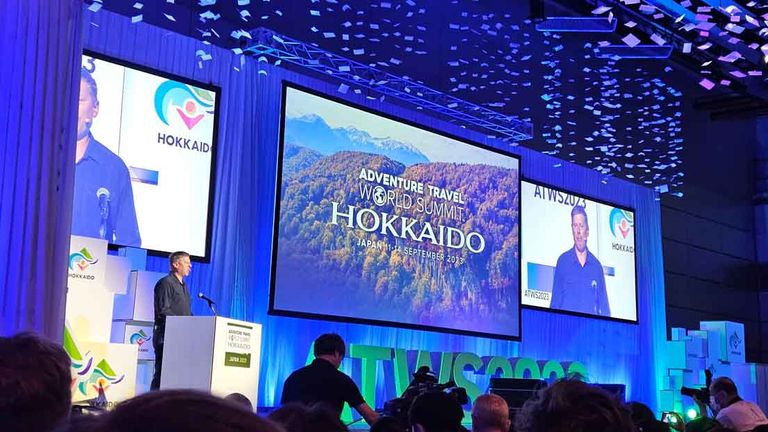After a two-year delay due to the pandemic, the Adventure Travel Trade Association (ATTA) hosted its 19th Adventure Travel World Summit (ATWS) in Japan from Sept. 11-14. Japan is the first Asian country to host the ATWS, which took place in Hokkaido — the northernmost of Japan’s main islands — in the prefecture capital of Sapporo.
Some 800 delegates from 65 countries came together for the event, where multiday pre- and post-summit adventures and a Day of Adventure kicked off ATWS to offer industry professionals, media and business owners the chance to discover Hokkaido’s dramatic wildernesses, indigenous Ainu culture and wealth of outdoor adventures. Along with activities such as hiking, cycling and watersports, the agenda included keynote speeches, seminars, discussions, networking events, workshops and cocktail receptions.
In keeping with the summit theme of “chowa” — which means “harmony” and serves as a reminder to look beyond our own individuality — topics were focused on how the adventure travel industry can work in partnership with destinations, communities, new technologies and nature to better serve clients and the planet.
To incorporate the destination's Shinto faith and culture and spiritual connection to nature, some talks took a less practical, actionable approach and focused more on inspiring ideas and notions regarding our personal relationships to the natural world, such as speaker Pupak Haghighi’s keynote on the importance of rewilding to restore inner chowa.
 Shannon Stowell, CEO of the ATTA
Shannon Stowell, CEO of the ATTA
Credit: 2023 Zoe Baillargeon
"It's up to us to show how tourism can be done right,” said Shannon Stowell, CEO of the ATTA, in his welcome speech. "It's an opportunity to stand out from messy mass travel and show how adventure travel is respectful of local communities.”
Here are some of the key takeaways from the ATTA World Summit.
AI Is Here to Stay
The growth of easily accessible and usable artificial intelligence (AI) platforms such as ChatGPT stands to revolutionize many aspects of internet usage, including how people search for and book travel experiences. In short: AI has arrived in the adventure travel industry, and it’s not going anywhere.
"We don't want to get left behind," Stowell declared in his opening remarks about the rise of AI.
Talks such as “ChowaGPT: Achieving Sales & Marketing Harmony With AI and Human Connection” explored how tour operators, business owners and industry professionals can utilize AI to improve efficiency, reduce labor costs, increase bookings and streamline business operations. Media members also discussed how AI may negatively impact the livelihood of writers, as well as the dangers of using content without consent or compensation.
By better understanding AI, businesses can make their own educated choices about how to use it in conjunction with a human workforce to meet the needs of the business and their clients.
We Need to Be Givers, not Takers
In 2022, international tourism recovered 63% of pre-pandemic levels, with more than 900 million tourists traveling internationally, according to the World Tourism Organization. Consequently, overtourism and a responsibility to the communities and destinations in which travel brands operate were big discussion topics throughout the summit.
As destinations struggle with overtourism and upset locals push back against unwanted visitors, operators have a responsibility to respect, support and cooperate with the locations they visit.
"There is no future for travel and tourism if you’re not welcomed and embraced by locals,” said Stowell of the ATTA.
In her rewilding keynote, Haghighi echoed similar sentiments about how disconnection from nature has resulted in extractive tourism around the globe.
“We need to change our course from being takers to givers,” she said. “Travel organizers have a key responsibility to be in wild places, to learn to communicate in nature’s way and to connect.”
We need to change our course from being takers to givers. Travel organizers have a key responsibility to be in wild places, to learn to communicate in nature’s way and to connect.
Talks such as “Communities First: Investing in Indigenous and Community Tourism” explored how industry professionals and business owners could navigate this, finding a balance between working with local communities to build stronger relationships and bringing tourism that uplifts rather than burdens a destination.
As Climate Change Disruptions Continue, Sustainability is Paramount
The continued threat and disruption of climate change also commanded a lot of attention at the summit, with many seminars and talks centered around sustainability in business.
Although the number of member organizations working toward getting a sustainability certification jumped to 68% in 2023 (up from 45% the previous year), Stowell called for more formal commitments to sustainability initiatives from members, emphasizing the importance of taking the first imperfect steps.
Members were also encouraged to learn about and join various sustainability initiatives such as Tomorrow’s Air, which helps with pressing issues such as carbon dioxide removal.
Interconnectedness Matters
At the end of the summit, delegates were sent off with a thoughtful speech from travel writer Pico Iyer about the importance of harmony and being part of the natural order.
"The whole is greater than the sum of the parts,” he remarked during his keynote, “The Land of Wa,” likening the global ATTA community to the closeness of Japanese communities and families, and how this interconnectedness is an essential tool in combating the issues facing the world and the industry today.
As the event wrapped up, Gabriella Stowell, vice president of regional development for the ATTA, announced the location of the next ATWS during closing remarks: Panama from Oct. 7-10, 2024.